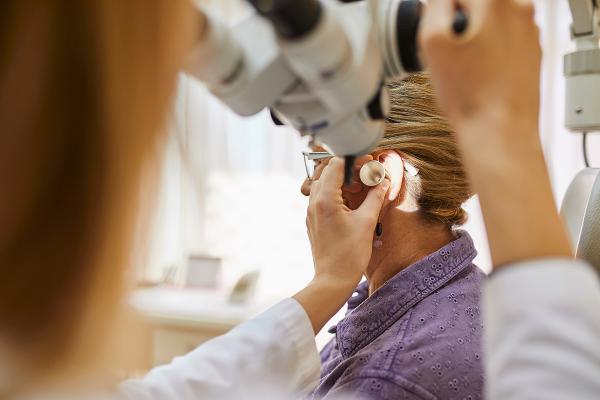Improve your hearing, improve your health: 5 surprising connections
From avoiding loneliness to reducing falls, here is how hearing well may boost the quality of your life.

Being able to hear may let you keep up with friends, listen to the music you love, and enjoy bingeing your favorite series. But hearing well does more than just make life fun. It may boost your quality of life in countless ways.
That’s why it’s important to address hearing problems early. Untreated hearing loss in older adults is linked to health issues such as depression, falls, and more.1
So, if your hearing isn’t as sharp as it used to be, it’s a good idea to have it checked. “Early identification and management of hearing loss can have lasting benefits for your overall health,” says Bria Collins, Au.D. She is an associate director of audiology practices with the American Speech-Language-Hearing Association.
That’s why it may be time for a hearing exam and consultation with a hearing care professional. Your provider might suggest that you get hearing aids so you may hear better.
Not sure it’s worth it? Here are 5 science-backed ways hearing well affects your mental and physical well-being.

UnitedHealthcare Hearing helps members access hearing exams, hearing aids and more. Sign in to learn more and check eligibility.
Better hearing lowers the risk of dementia
Hearing sounds and conversations helps keep the mind active. And that’s good for the brain. A recent study led by researchers at the Johns Hopkins Bloomberg School of Public Health found that the prevalence of dementia was 61% higher among study participants with moderate or severe hearing loss than among those with normal hearing.2
And treating hearing loss may have brain benefits, according to Johns Hopkins University researchers. They studied older adults at increased risk of cognitive decline who got hearing aids and other hearing assistive technologies and help from specialists. This group slowed down their thinking problems and memory loss by 48% over 3 years.3
Improved hearing may make you feel less isolated
“Humans are social. There are so many things that we do daily by communicating with other people,” says Collins. When a person is hard of hearing and hasn’t gotten help, taking part in social situations becomes more difficult.
Here’s why: People tend to avoid places where they know it will be hard to hear, says Collins. That can include activities such as eating with friends, attending parties, or going to movie theaters. You might stay home more often, even if you live alone.
And being lonely has the potential to harm your health in several ways. Loneliness and social isolation are associated with an increased risk of heart disease, stroke, depression, and dementia.4
Wearing hearing aids may reduce the risk of isolation. It’s a good idea to open up to your loved ones about any hearing trouble you’re having. Ask if they can speak louder and more clearly. And get together in quieter places. Taking these steps may make socializing more enjoyable, which helps you stay in touch.5
You don’t need a referral to request a comprehensive hearing exam and consultation with UnitedHealthcare Hearing. Find a provider.
Hearing well may mean fewer falls
Each year, roughly 3 million older adults end up in the emergency room after a fall, according to the Centers for Disease Control and Prevention.6 It makes sense that vision problems would play a role. But poor hearing may also play a role.
“Hearing loss, especially when untreated, increases your fall risk,” says Collins. That’s because the inner ear plays a key role in helping you maintain your balance.7 When your hearing is off, your body isn’t receiving the information it needs to stay balanced.
Wearing hearing aids cuts the risk of falling in half, compared with people with hearing loss who don’t use hearing aids, according to researchers at the University of Colorado School of Medicine.8 Are you having problems staying steady on your feet? Consider requesting a hearing appointment with a hearing care professional.
Better hearing might ward off depression
When listening to others gets too tough, you could be tempted to pull away from the people and activities you love. And that may leave you vulnerable to developing depression.4
In fact, compared with those with no hearing loss, people with moderate or greater hearing loss have a twofold increased risk of depression, according to one study.9 But it’s not just the loss of social connections that affects your mental health. In addition, hearing loss has been shown to be associated with decreased activation in certain areas of the brain.9 And those changes in the brain may contribute to depression and anxiety.
If you’re depressed, you can get help from a therapist. You can do this online or in person. But it may also help to get your hearing checked to see if hearing loss may be contributing. People with moderate hearing loss who used hearing aids were 34% less likely to experience psychological distress than those without hearing aids, the researchers from Johns Hopkins found.9
Hearing well may help improve your quality of life
The less you hear, the more difficult it may be to hold a job, volunteer, or enjoy activities with friends and family members. And that can shrink your world.10
The best way to improve your health-related quality of life if you notice hearing problems? Treat the hearing loss early with hearing aids, researchers from Duke University say.11
By boosting your hearing, you may start enjoying the little and big things in life again. Laughing with friends because you understand the joke? Being able to listen to your partner and family members tell you they love you? These are things that make life better.
Sources
- Hearing loss Mayo Clinic. Accessed February 9, 2023.
- Hearing loss and dementia prevalence in older adults in the US JAMA. Published January 10, 2023.
- ACHIEVE healthy aging Johns Hopkins Bloomberg School of Public Health. Accessed December 18, 2023.
- Health effects of social isolation and loneliness Centers for Disease Control and Prevention. Last reviewed March 26, 2024.
- Hearing loss: a common problem for older adults National Institute on Aging. Last reviewed January 19, 2023.
- Facts about falls Centers for Disease Control and Prevention. Last updated May 9, 2024.
- Increased risk of falling American Academy of Audiology. Accessed December 18, 2023.
- Consistent hearing aid use is associated with lower fall prevalence and risk in older adults with hearing loss Journal of the American Geriatric Society. Published October 2023.
- Association of hearing loss with psychological distress and utilization of mental health services among adults in the United States JAMA Network Open. Published July 2020.
- Hearing difficulties among adults: United States, 2019 Centers for Disease Control and Prevention. Published July 2021.
- The impact of hearing loss and its treatment on health-related quality of life utility: a systematic review with meta-analysis Journal of General Internal Medicine. Published February 2023.
Information is for educational purposes only and is not a substitute for the advice of a licensed medical provider. Consult your provider prior to making changes to your lifestyle or health care routine.


